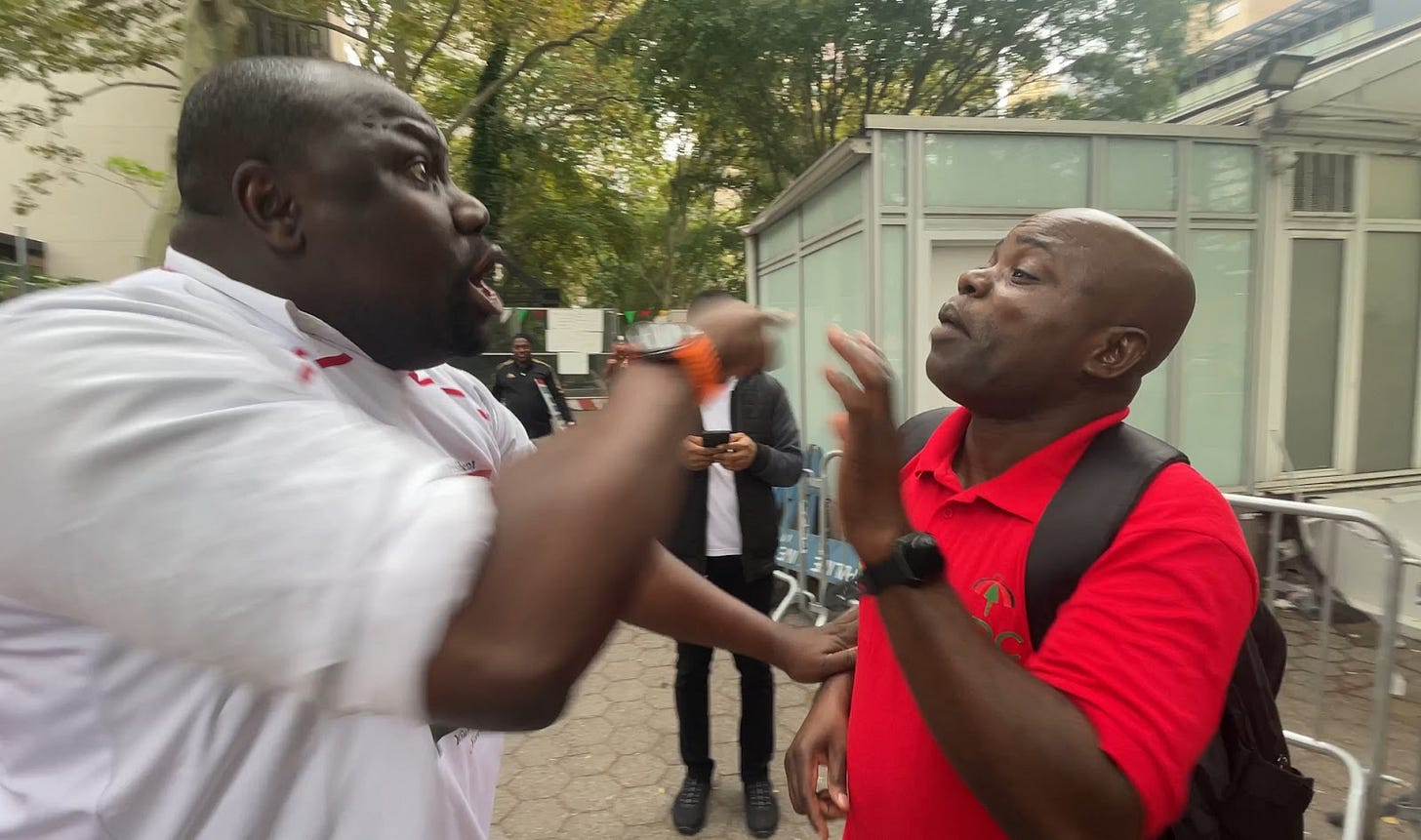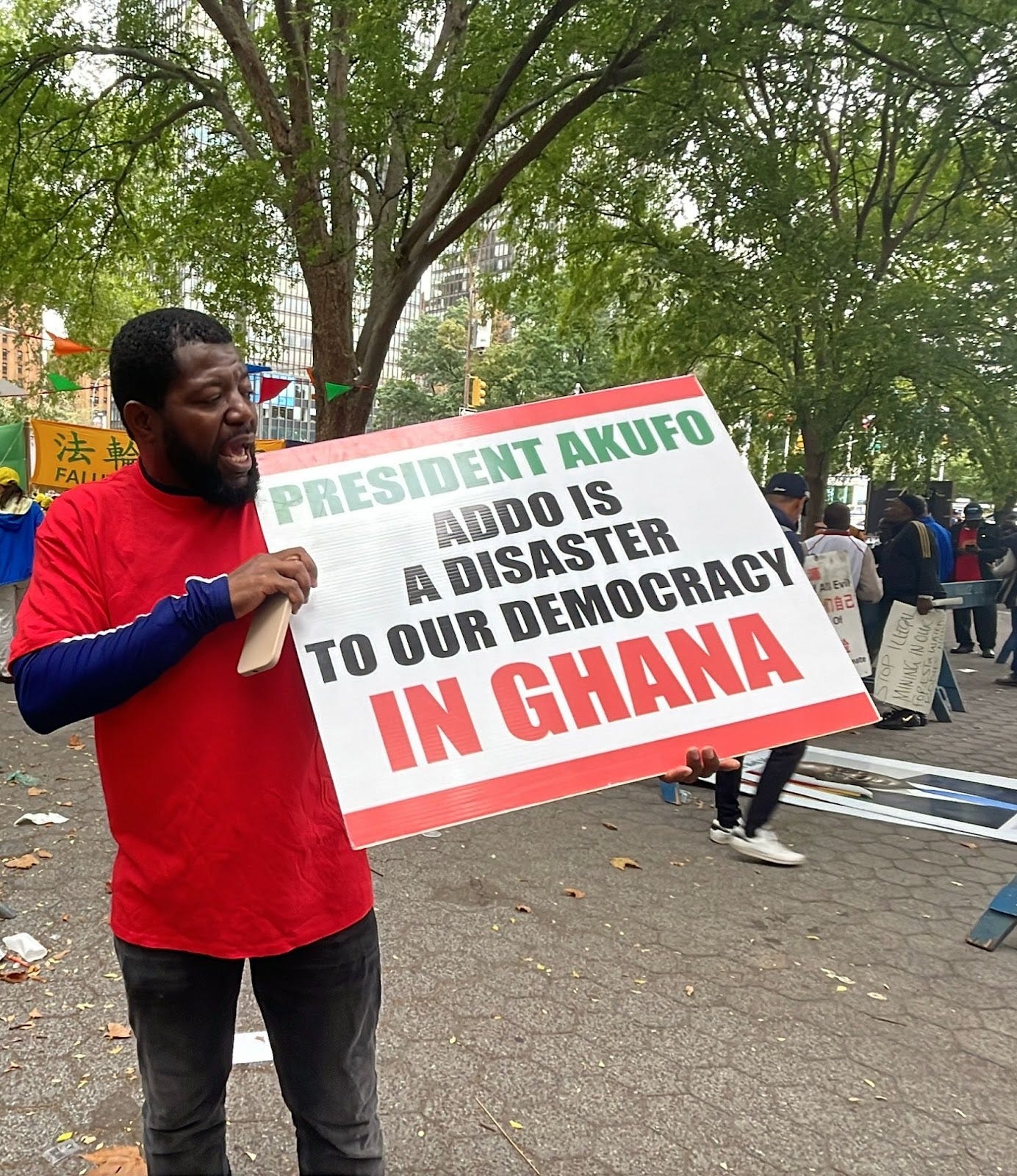Ghana’s 2024 Election: A Nation Divided Between Press Freedom Fears, Economic Woes, and Political Tension
Heated Street Debate Outside the U.N. General Assembly
As Ghana gears up for the 2024 general election, the nation finds itself at a critical juncture. On the surface, Ghana is seen as a democratic beacon in West Africa, with a proud history of peaceful transitions of power since 1992. Yet, beneath the calm veneer, storm clouds are brewing—allegations of corruption, suppression of free speech, and economic mismanagement are threatening to unsettle the political landscape. Protesters have taken to the streets in both Accra and at Ghanaian diaspora rallies outside the United Nations, voicing their dissatisfaction with the current government under President Nana Akufo-Addo.
A Political Tug of War
Ghana's political sphere has been dominated by two major parties for decades: the New Patriotic Party (NPP) and the National Democratic Congress (NDC). Since 1992, the two parties have each won four elections, with the NPP consistently holding power since 2000 through tight election cycles. The 2024 race, however, promises to be particularly fierce.
Vice President Mahamudu Bawumia, the NPP's candidate, is vying for a third consecutive NPP victory, a feat never before achieved in Ghana's multiparty democracy. On the other side of the ring, the ever-resilient John Mahama of the NDC is making his bid to return to power after two narrow defeats. With these giants set to clash, Ghana is headed toward one of its most competitive elections yet.
Silencing Dissent?
Yet, the election buzz is about more than just politics as usual. Accusations of human rights violations and the silencing of journalists have cast a shadow over the current administration. Protesters outside the United Nations have pointed fingers at the government, claiming it has stifled press freedom and cracked down on dissenting voices.
The situation isn’t helped by Ghana's recent drop in the global press freedom index. According to Reporters Without Borders, Ghana has seen a worrying trend of assaults on journalists, especially those critical of government policies. In a country once hailed as a beacon of press freedom in Africa, such developments are ringing alarm bells.
In fact, protesters claim that the government is using laws like the Electronic Communications Act to arrest and intimidate journalists, a charge that Amnesty International has highlighted in recent reports. Critics argue that these moves are deliberate efforts to create a culture of fear in the media landscape, ensuring that dissent is kept to a whisper.
A Struggling Economy
Compounding the political tensions are economic challenges that are weighing heavily on the electorate. Ghana is grappling with soaring inflation rates—reaching as high as 53.6% at the start of 2023 before easing slightly to 26.4%. While the International Monetary Fund (IMF) has stepped in with a $3 billion bailout, it comes with strings attached. Harsh economic reforms, debt restructuring, and cuts to public spending are on the horizon, leaving Ghanaians wondering whether the economic relief will outweigh the inevitable short-term pain.
The numbers don’t lie. Ghana’s Fragile States Index (FSI) score reflects the economic stress felt across the nation, with group grievance and economic inequality standing out as significant challenges. The country’s Human Development Index (HDI), while relatively stable at 0.602, underscores the economic disparity between different regions and social groups.
The Election Data That Speaks Volumes
Source: Peacekeeper Insight via Electoral Commission of Ghana
A look at the data tells us that the electoral battlefield has always been fiercely contested. From the NDC's early victory in 1992 with a commanding 58.3% of the vote, to the NPP’s slim win in 2020 with 51.2%, it’s clear that neither party has a stranglehold on power. Elections have swung in both directions, often with razor-thin margins.
But the cumulative voting trends paint an interesting picture. While the NDC dominated the early years of democracy, their winning percentage has fallen below 51% in every election since 1996. In contrast, the NPP, since its breakthrough in 2000, has consistently hovered above 50% in its victories. A cumulative vote share analysis shows that while both parties are competitive, the NPP has maintained a slight upper hand in recent cycles, thanks to its ability to secure tight run-off victories when necessary.
Yet, this very competitiveness also means that the stakes are higher than ever. In swing regions like Greater Accra, Central, and Western, where neither party has a clear advantage, every vote will count. With the economy in a fragile state and trust in democratic institutions teetering, this election could prove to be a defining moment for Ghana.
What’s at Stake?
For Ghanaians, this election is about more than choosing a president; it’s about setting the direction for the next decade. Will the country tackle corruption head-on? Will economic reforms help lift millions out of poverty, or will they exacerbate inequality? Can the media hold those in power accountable, or will press freedom continue to erode?
While President Akufo-Addo steps down after completing his constitutionally limited term, the legacy he leaves behind will influence the dynamics of the upcoming race. His administration has drawn both praise and criticism—praise for stabilizing democracy, and criticism for alleged human rights violations. The question now is whether Ghanaians see this as a step forward or a backward slide.
The Road Ahead
As the 2024 elections draw closer, Ghanaians at home and abroad are watching closely. The international community, too, has its eyes on Accra. Will Ghana’s democracy, praised for its peaceful transitions and competitive elections, hold firm under the weight of economic hardship and growing political unrest? Or will the tension spill over, pushing the country into uncharted waters?
Only time will tell, but one thing is certain: the battle lines have been drawn, and Ghana’s political landscape is more unpredictable than ever.
Insights from the Global Indicators
To fully understand the complexities of Ghana’s political and social landscape leading up to the 2024 election, one must look beyond the headlines and protests. The numbers tell a compelling story, especially when you dive into the global indicators. ARAC International’s analytical report, which aggregates data from the Global Peace Index (GPI), Positive Peace Index (PPI), Fragile States Index (FSI), and the Bertelsmann Transformation Index (BTI), reveals the nuanced layers of Ghana’s stability—and instability.
Subscribe to a paid version of the newsletter see the full detailed analysis and risk assessment provided by MNS Consulting. All proceeds go towards ARAC International Inc. a 501(c)(3) nonprofit research and analytic organization advocating for peacebuilding and conflict prevention. Your subscription and donations are tax-deductible and help support our research and advocacy work.
Keep reading with a 7-day free trial
Subscribe to ARAC International | Flashpoints & Frameworks to keep reading this post and get 7 days of free access to the full post archives.





